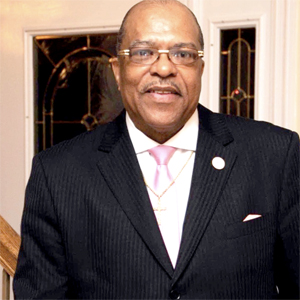REV. DR. ISAIAH ROBINSON, JR. DMIN./ PhD

ISAIAH 6: 1-8; 38:1-5
KEY VERSE: “I heard the voice of the Lord, saying, Whom shall I send, and who will go for us? Then said I, Here am I, send me .”(Isaiah 6:8, KJV)
INTRODUCTION: The book of Isaiah is one of the richest prophetic texts in the Hebrew Bible, offering profound theological themes about God. Specifically, Isaiah provides insights relating to God’s holiness, judgment, mercy, and redemption. The prophet Isaiah served during the reigns of four kings – Uzziah, Jotham, Ahaz, and Hezekiah- was both a messenger to and an intercessor for Judah. Isaiah 6 :1-8 AND 38:1-5 encapsulate critical moments in his ministry, offering unique perspectives of his call along with a demonstration of God’s power and mercy. Isaiah 6 records Isaiah’s transformative vision of God’s glory, culminating in his commission as a prophet. Isaiah 38 shifts to an account of King Hezekiah’s illness and miraculous healing, where Isaiah served as the intermediary between the king and God. Together, these passages highlight the interplay between divine holiness, human inadequacy, and God’s grace that empowers ministry.
THE CALL OF GOD’S PROPHET: THREE ELEMENTS NECESSARY TO SERVE GOD (6:1-13). There seem to be two types of calls from God. The first type is what we might designate as a “general” call. These are the thoughts, actions, and attitudes that God expects of every believer. The second type is what we might designate as a “specific” call, a sensed call of God to a particular or specialized ministry. Many are called, but few are chosen (Mt. 20:16; 22:14). This means that many have been called by God to minister to people, but few have ever responded to the call. No matter what the call to service may be, if the call comes from God, we should surrender to the call. In the year that King Uzziah died, the Lord gave Isaiah an extraordinary vision of Himself. Young Isaiah needed this special encounter with the Lord. First, Isaiah’s faith needed to be strengthened. He needed to know beyond any doubt who the Lord is and the extreme importance of the message being given to him. It was the Lord of hosts, the sovereign Creator and Majesty of the Universe, who was calling him to proclaim God’s message to the world. Second, Isaiah needed to be humbled. He needed to be shown just what terrible sinners he and the people were, especially when seen in the light of God’s glory and holiness (v.3,5). Third, Isaiah needed to be stirred with a renewed sense of urgency to proclaim God’s warning of coming judgment. It was absolutely essential that the people repent, turn back to the Lord if they were to escape the coming judgment. If they failed to repent, God’s execution of justice was sure to sweep down upon them. Fourth, Isaiah needed to be prepared for a challenging and difficult ministry. The people’s hearts were hard, and their ears were deaf, and their eyes were blinded to the truth of God’s Word that He alone is the only living and true God. They had to be charged to worship Him alone and to obey Him, living righteous and holy lives as His commandment stipulates. Fifth, this was a critical time in the history of the nation. King Uzziah was either dying or else already dead. Under Uzziah’s leadership, the nation had flourished economically and militarily.
Uzziah’s death marked a major change in the history of the Jews. The prosperity and peace that the nation had known began to decline. His son Jotham was a good king, but Jotham’s son was a terrible ruler. He led the nation in a spiral of wickedness and false worship.
Commissioned by God- (What Isaiah Saw( v 1b.) To this end, Isaiah was being called to be courageous and stand and minister the Word of the Lord to the nation. He was a royal adviser and sought the Lord. When any genuine believer seeks the Lord, the Lord meets the believer’s need. In Isaiah’s case, the Lord gave him a very special vision of Himself. He saw the Lord sitting on the throne of God, high and exalted in the heavenly temple.
Three Elements Necessary to Serve God. (1) A Vision of the Lord (vv.1-4).
(2) A Conviction of Unworthiness, all are sinners and need cleaning (vv.5-7).
(3)A Surrender to the Lord, to His Call and Commission (vv.8-13). The Lord’s majesty and glory made it impossible for him to fully behold Him. He observed God’s location and what was happening around Him- not His face or any identifying features. Surrounding God’s throne, He saw seraphim, angelic beings with six wings (v.2). Two wings covered their faces, signifying reverence. Two wings covered their feet, indicating humility and modesty. They used the final two wings for flight, symbolizing their readiness to serve God. Their presence underscores the intensity of divine holiness and the necessary purification before entering God’s service. They called to one another, “Holy, holy, holy, is the Lord of hosts; the whole earth is full of His glory” (v3). The triple repetition of “holy” emphasizes God’s absolute purity, supreme righteousness, uniqueness, and transcendence. At their words, the Temple filled with smoke and its foundations shook. This signifies God’s divine presence, His divine majesty, and judgment.

